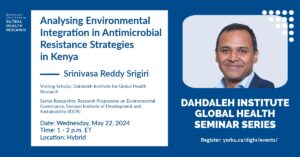Post
Published on July 10, 2024

Dahdaleh visiting fellow Dr. Srinivasa Reddy Srigiri presented an extensive overview of the global challenges posed by antimicrobial resistance (AMR) to public health and economies in a thought-provoking seminar on May 22, 2024. Using Kenya as a case study, he sought to highlight the insufficient integration of the environmental dimensions in existing mitigation strategies, along with the existing governance hurdles that the country is facing.
To begin, Dr. Srigiri provided a background on the causes and consequences of AMR in a global context. He discussed how antimicrobial substances entering the environment can contribute to AMR, citing alarming statistics of associated and attributed deaths and projected losses by 2050. Unfortunately, global efforts to combat AMR, such as the World Health Organization's Global Action Plan and national strategies have limited integration of environmental concerns in earlier plans, although gradual inclusion through initiatives like the Inter-Agency Coordinating Group of the United Nations (UN) has begun.
Transitioning to the Kenyan context, Dr. Srigiri discussed the country's AMR governance architecture and identified gaps in environmental integration. Despite the formulation of a National Action Plan, the limited surveillance efforts and regulatory frameworks overlook environmental dimensions. Institutional shortcomings, such as the absence of water resources authority in key committees, have been known to hinder effective coordination for mitigating AMR emergence and spread in water resources. Dr. Srigiri then focused on Kenya's evolving approach in the second phase of the National Action Plan which showed improved emphasis on environmental aspects. Yet, governance remained fragmented across ministries leading to ineffectiveness of existing coordination mechanisms. Dr. Srigiri stressed the need for strengthening capacities of key actors in environmental and water governance towards integrating regulation of antimicrobials and AMR pathogens into environmental governance as well as mainstreaming environmental aspects in AMR mitigation strategies.
Looking ahead, Dr. Srigiri shared ongoing research efforts, continuation of data analysis on the Kenyan case and conducting a similar case study in Cambodia, aimed at identifying barriers and enablers for effective governance. He advocated the importance of characterizing key actors and understanding informal rules shaping decision-making processes. Dr. Srigiri's presentation expressed the need for a more nuanced analysis for understanding conditions that enable and enhance coordination and integration, at various levels (global to sub-national), to address the multifaceted challenge of AMR effectively.
Watch the seminar presentation below:
Connect with Dr. Srinivasa Srigiri
Themes | Planetary Health |
Status | Active |
Related Work |
N/A
|
Updates |
N/A
|
People |
Srinivasa Reddy Srigiri, Visiting Scholar, German Institute of Development and Sustainability - Alum
|
You may also be interested in...
Call for Applications — 2025 Seed Grants for Critical Social Science Perspectives in Global Health Research
The Dahdaleh Institute for Global Health Research is accepting applications for the 2025 Seed Grants for Critical Social Science Perspectives in Global Health Research. York graduate students and research fellows are welcome to apply with the ...Read more about this Post
Join Us This September for Our Global Health Research Seminar Series
We are kicking off the 2022-23 academic year at the Dahdaleh Institute with some wonderful global health research talks this September: disaster management, humanitarian response, occupational health, and planetary health. All events will be delivered in ...Read more about this Post
The Victor Dahdaleh Foundation to support University facilities, selected programming with $4M gift
The gift will support upgrades to the Victor Phillip Dahdaleh Building on York University’s Keele Campus, provide operating funding to CIFAL York and support a new operations facility for the Advanced Disaster, Emergency and Rapid Response Simulation ...Read more about this Post



